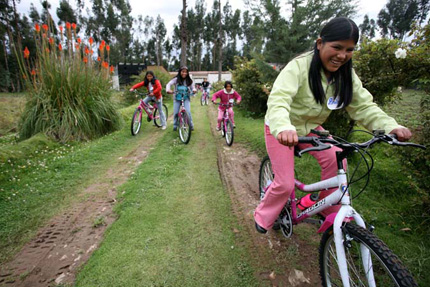
As Kiva and other microfinancing groups show, philanthropy can be tailored to any size and still make an impact. When Dan Austin, a writer, filmmaker and cycling enthusiast first met children in a Cambodian orphanage in 2006, he wanted nothing more than to give them a taste of the exuberant feeling of freedom known to every suburban American kid. So he figured out a way to give them bikes. Working with Friends of Cambodian Children, Austin, his brother Jared (a Mayo Clinic pediatrician) and Nicolas Arauz (a designer and social media entrepreneur) donated 88 bicycles in 2007 to the Palm Tree Orphanage in Phnom Penh that were paid for by funds the men collected in a couple of weeks.
From this simple gesture — a sampling of what Austin describes as “joy-based philanthropy,” an act that, he believes, is “on a par with sustenance”— the 88Bikes Foundation was launched. Donors log onto the website to pledge $88, roughly the cost of a bike purchased in each of the countries where the foundation has been active. In 2008, working with the Global Youth Partnership for Africa, it supplied kids stranded in a refugee camp in northern Uganda with 200 bicycles. In early 2009, partnering with Andean Outreach, it donated 120 to the occupants of three orphanages in Huancayo, Peru — children, who like many of their peers in other parts of the developing world, suffer from the twin traumas of HIV infection and local warfare.
To save on shipping costs, support local economies and supply bicycles that look familiar to the children and are suited to their terrain, 88Bikes sources from local manufacturers and distributors. Its Peru project, however, marked the first time the foundation sent a volunteer on site to develop a bike shop and apprenticeship program to train the children to do repairs. The Austins and Arauz take no salaries and sponsor their own travel and administrative expenses; matching funds to pay for the repair shops and training are provided by Keen, the footwear company.
Even for modest enterprises, growth can be irresistible. And as 88Bikes approaches its fourth year in 2010, its founders are multiplying their philanthropic targets accordingly. They plan to touch down in Ghana, India, Nepal and Vietnam to distribute 300 bikes along with information about how to maintain them. Partner nonprofits will include Free the Slaves and Touch a Life, organizations that focus on doing away with human trafficking. "As we continue to evolve, anything is possible," Austin says, "but there is plenty to be done simply giving bikes to children, setting up apprenticeships, teaching children how to use and care for their bikes and setting up bike shops at select destinations that will become viable social enterprises."


Comments [3]
http://www.konaafricabike.com/
11.02.09
01:20
http://rolexawards.com/en/the-laureates/davidschweidenback-home.jsp
11.02.09
03:11
Seeing the JOY of the kids is what motivates us all to take action.
Helping them to experience it fully is such a blessing!
11.03.09
12:04